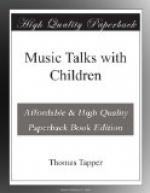I have always been impressed in reading the books of John Ruskin to note how many times he speaks about the hands. Very truly, indeed, does he recognize that back of all hand work there is heart-thought, commanding, directing, actually building. It shows everywhere. The building of a wall with the stones rightly placed demands honor. The builder may be rude, but if his hands place the stones faithfully one upon another, there is surely honor in his heart. If it were not so his hands could not work faithfully.
If the work is finer, like that work in gold which many have learned eagerly in former times, in Rome and Florence, still the spirit must be the same. So we see, that be the work coarse or fine, it is in either case prompted by the same kind of heart-thought.
Many times in these Talks I have spoken of Ruskin’s words to you; for two reasons: first, his words are always full of meaning, because he was so full of thought when he wrote them; and second, I would have you, from the first days, know something of him and elect him to your friendship. Many times he will speak to you in short, rude words, impatiently too, but never mind that, his heart is warm and full of good.
Now from what was said a moment ago about the stone work and the gold work we can understand these words:
“No distinction exists between artist and artisan, except that of higher genius or better conduct.”
Learn from this then, be the work of our hands what it may, its first quality and the first things for which it shall be judged are its honor, its faithfulness, and its sincerity.
Of themselves the hands are absolutely without power. They cannot move, they cannot do good things nor bad things, they can do nothing until we command them. And how shall this be done? Surely I can understand it if you have wearied of this Talk a little. But I have said all the things just for the sake of answering this question, so that you should understand it. How do we command? not the hands alone but all we do and say?
By our THOUGHTS.
Without them there is no power whatever. Until they have commanded, the hands cannot make a motion; the feet must have direction ordered to them, the tongue must be bidden to speak, and without the command there is nothing.
Of course, all these Talks are about thoughts. But we shall need a little time to speak of them particularly. And little by little it will be clear to us all why the hands need to act thoughtfully. Now the harm of the world is done by two forces,—by evil thought and by thoughtlessness. Then it is no wonder that Ruskin speaks much about the hands, for it is thought that gives them guidance. Can you wonder, that when he says, “the idle and loud of tongue” he associates the “useless hand."[54] These things go together, and together they come either from evil thought or from lack of thought. The moment Ruskin speaks of one who uses his hands with honor, his words glow. So he speaks of the laborer, describing him as “silent, serviceable, honorable, keeping faith, untouched by change, to his country and to Heaven.”




